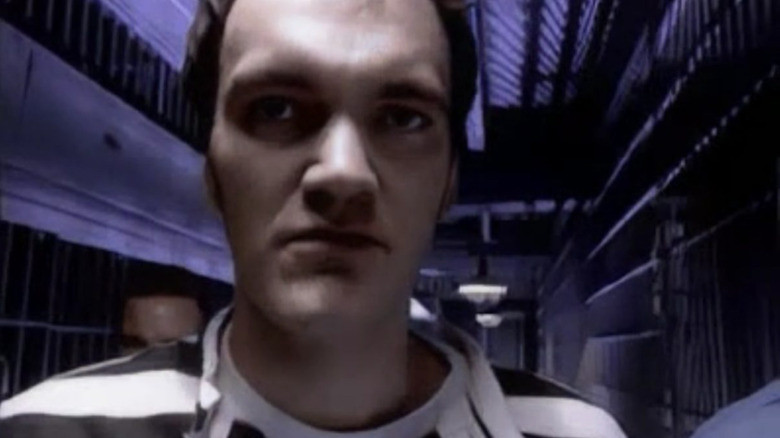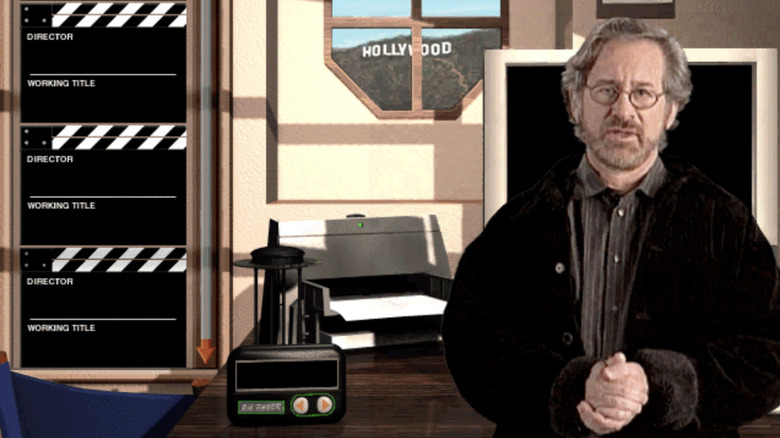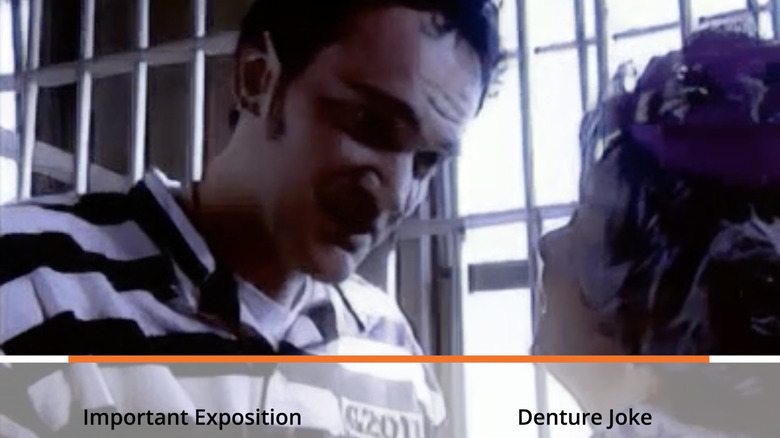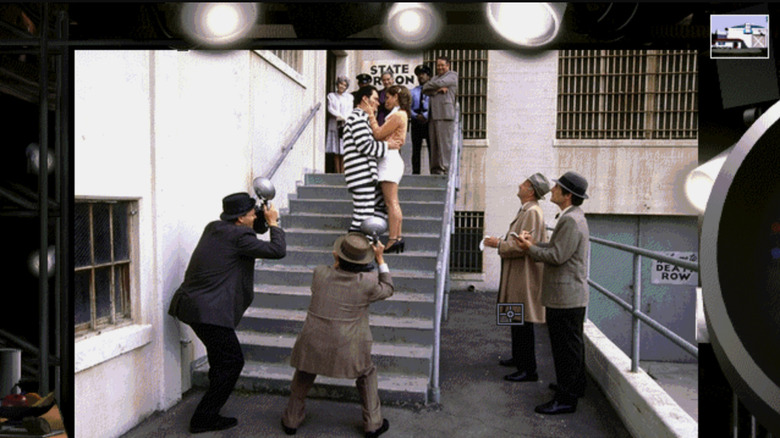Quentin Tarantino's Weirdest Role Was In A Steven Spielberg Video Game
We might be in the era of The Brand Movie, but the 1990s were a heyday for branded video games and some of the most unlikely people wound up with a game of their own. There's "Chex Mix: Chex Quest," Shelley Duvall's It's A Bird's Life," 7up's "Spot Goes to Hollywood," "Make My Video: Marky Mark And The Funky Bunch," and of course, "Pepsiman." Most of these games are terrible at best and unplayable at worst, but there's a certain charm to playing something so clearly intended to make a quick buck off of name recognition. But then there's "Steven Spielberg's Director's Chair," a game that for all intents and purposes was made with the goal of inspiring the next generation of filmmakers by meeting them halfway and educating them through a medium they were already enjoying.
Created by Knowledge Adventure (the folks behind Neopets, "MathBlasters," and the "JumpStart" educational games), "Steven Spielberg's Director's Chair" is a simulation game that allows players to learn what it takes to make a movie, including editing clips and designing a poster to help market it to the masses. Back in 1997, this game was a pretty novel idea, but now that a huge chunk of the population has at least working knowledge of editing thanks to apps like Instagram and TikTok, playing the game now sort of just feels like work. Spielberg was obviously the big name attached to the game, but the game (and film's script) came from Ted Elliott and Terry Rossio ("Aladdin," "The Mask of Zorro," "Shrek") and the footage shot for the short film within the game starred famous Hollywood actors like Jennifer Aniston from "Friends," Katherine Helmond from "Soap," and an up-and-comer by the name of *checks notes* Quentin Tarantino.
Seriously, you're directing a movie starring '90s-staple character actor, Quentin Tarantino.
A game too real to be fun
Making movies is hard, and it sort of seems like Steven Spielberg was focusing less on making an entertaining game about movie making, and instead wanted to shake off some of the idealism surrounding the entertainment industry and show people the difficulties that often arise. While you're making "your movie," you don't get to provide input on the script Ted Elliott and Terry Rossio are writing. Players essentially watch them "write" a script to see the formatting of a screenplay. Go to any coffee shop in Los Angeles and creep over someone's shoulders with a laptop and you can have the same riveting experience.
On a positive note, the game also features advice from Hollywood professionals such as editor Michael Kahn, special effects supervisor Michael Lantieri, and legendary cinematographer Dean Cundey, so while this game is arguably one of the least fun simulators you can play, it is pretty wild to see these figures on-screen and directing their attention toward you. The game is also loaded with full-motion video (FMV) clips, resembling the 1996 point-and-click horror adventure game "Harvester," but with less gore and a less "Twin Peaks" style story. (Side note: I have no idea how someone hasn't scooped up that IP to make a series yet.)
Spielberg himself actually directed all of the FMV clips, so it is wild to essentially edit your own Spielberg fan film. But the actual gameplay centers on keeping the film on time and on budget, which means you're simulating time allocation and doing math. Production problems happen and you have to figure out how to overcome them, which does help showcase just how many moving parts are involved in making a movie. But it is also painfully frustrating. If you fail to stay on time and budget, you'll end up on the front page of Variety with rude headlines. Ah, it's just like real life!
Your movie ... is weird
The movie you're making (which you get to title yourself) centers on a death row inmate heading for the electric chair (Tarantino) who was falsely found guilty of killing an old woman. Now, it's up to his girlfriend to clear his name and point to the real villains ... a pair of sinister magicians. Aniston was killing it on "Friends" and Tarantino had just seen great success with "Pulp Fiction," and the sinister magicians are portrayed by none other than Penn & Teller. Sure, okay. This is exactly the cast I would want on a $40 million budget film in 1997, which is $2 million more than the budget for "My Best Friend's Wedding." Everyone involved is genuinely putting their hearts into the performances, but Tarantino is hamming it up so hard he might as well be a human deli counter.
Maybe it's because he was in front of Spielberg's camera or maybe it's because the idea of acting in a FMV feels cartoonish in general, but it cannot be overstated how absolutely ridiculous his performance is. At one point, he gets in a tussle with prison security guards and starts shouting "Maybe you wanna die! Maybe you like to die! And maybe he," he says, before targeting his gun to the guard he's holding hostage, "doesn't!" I truly don't know why this is the take Spielberg kept for the final game (perhaps it was another bit of realism for the player to understand that sometimes brilliant creatives still make baffling decisions). Some wonderful preservationists have uploaded game footage to YouTube for us all to enjoy, which includes Jennifer Aniston's now-iconic "The Rachel" haircut in its pop cultural peak.
You can play the game today!
Because Spielberg is all about realism, in an infuriating (but possibly practical decision based on the limitations of '90s tech) decision, once you've finally put the movie together, the game makes you sit and wait for your movie to render in-game. Granted, it's not the hours upon hours an actual film would take, but it's still anywhere between 10-15 minutes. You can't click out, either. You literally just sit there and let it roll.
Eventually, you'll get to see your finished movie and show it to an audience, and most people will love it, but there will always be at least one loudmouth hater who thinks they could have done a better job. Good news, Twitter might not have existed in the 1990s, but That Guy certainly did! The more you play the game, the more options you'll unlock like a bigger budget, more camera angles of the scenes, new music/sound, and the director's dream — more shooting days.
This game marks Tarantino's last major acting role in something not made by him before focusing his attention on writing/directing full-time with the occasional cameo and documentary appearance thrown in for good measure. And although the game was thought to be a relic of the past, "Steven Spielberg's Director's Chair" was actually re-launched in 2020 by game creator and Carnegie University lecturer Paolo Pedercini. He adapted the game to be a browser-friendly alternative to booting up a 25+ year-old computer, and it plays out like a Choose Your Own Adventure game. You have just about as much agency with this game as you did with the original, which is to say, not a whole lot!
At the very least, if you didn't get the chance to play the game when it was released (or weren't even alive then), you can now enjoy the riveting experience in all of its pixelated glory.



